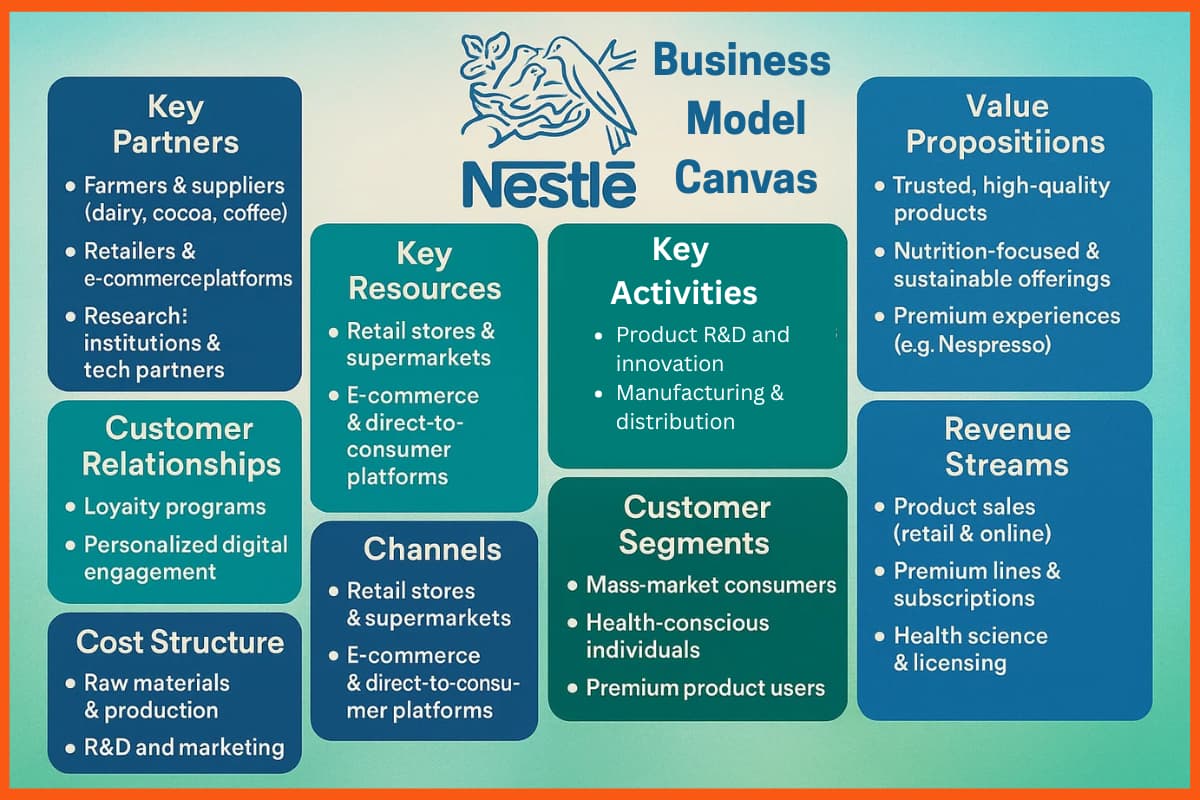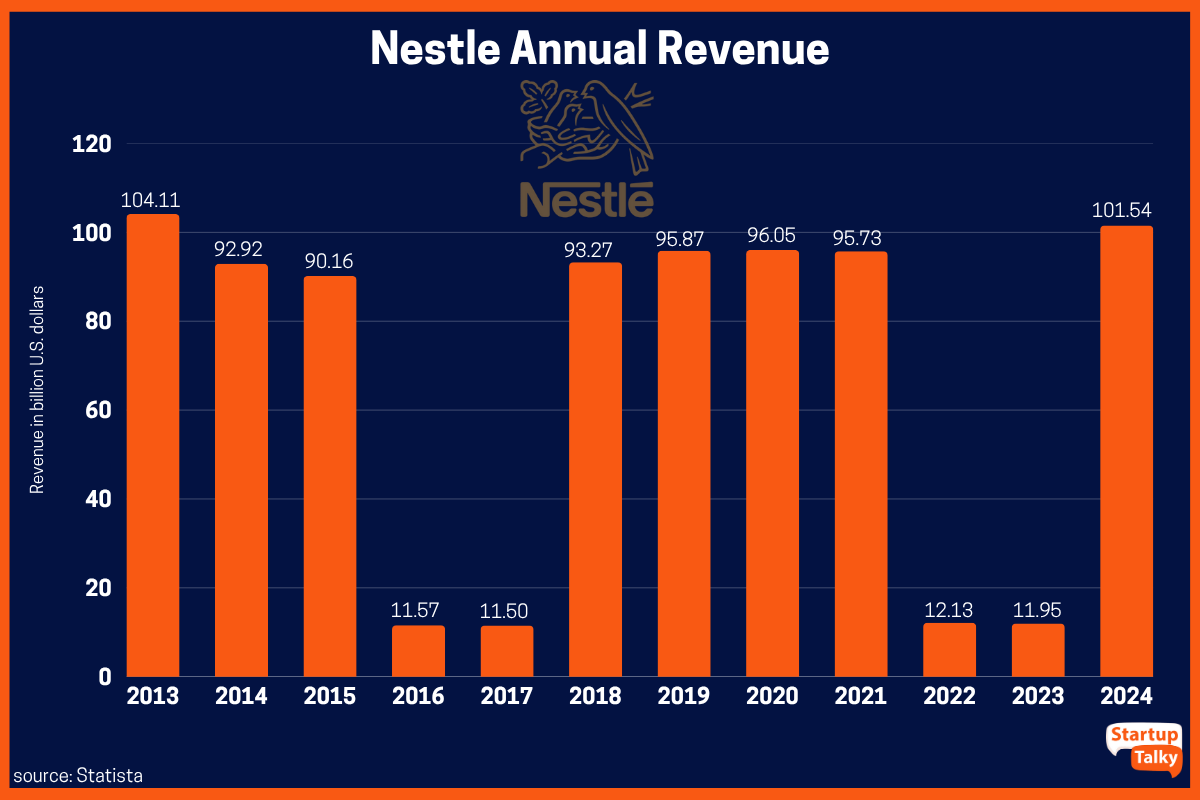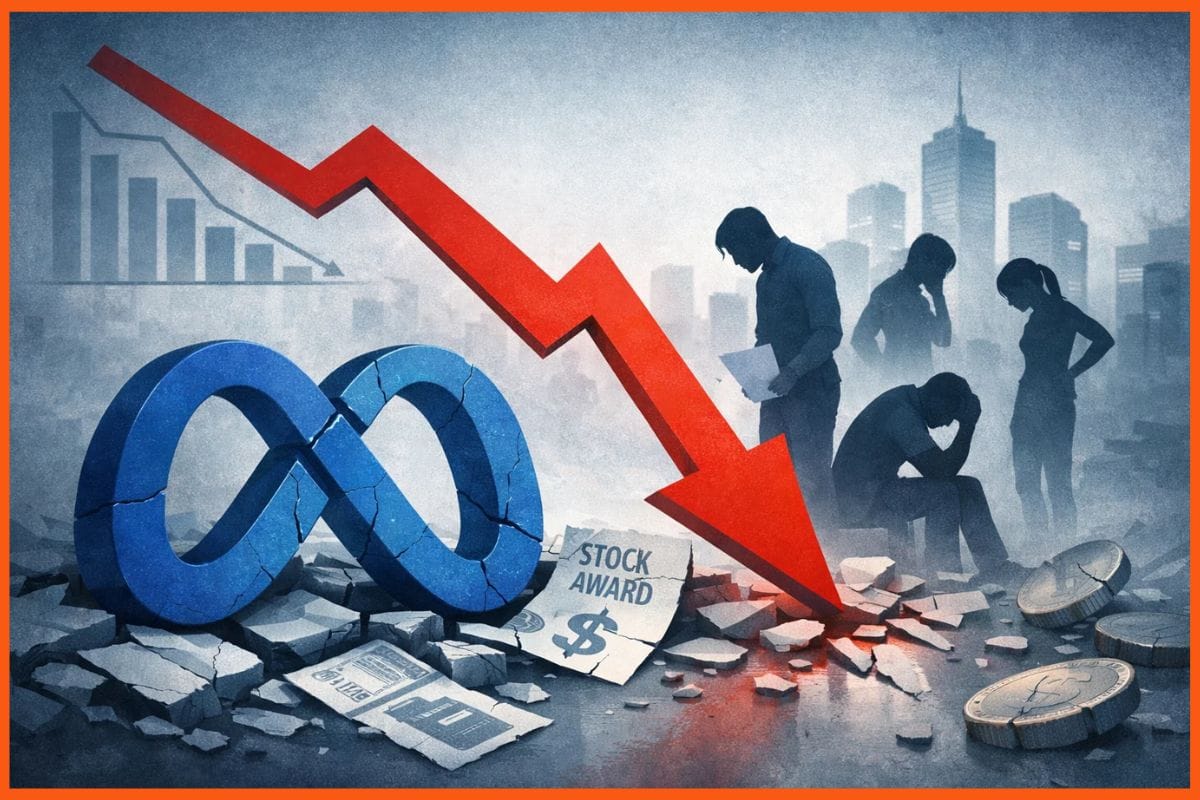Nestlé Business Model Canvas and Unique Strengths Explained
🔍Insights
The extensive Nestlé business model canvas offers valuable insights for owners and marketers. The multinational food and beverage corporation is able to have a significant market presence thanks to its elaborate and innovative business strategies. The business effectively links itself to health, well-being, and nutrition, which increases customer loyalty.
About Nestle
Nestle Business Model
How Nestle Makes Money?
USP of Nestle
SWOT Analysis
About Nestle

Nestlé's inspirational narrative began in Switzerland in the 1860s. Due to inadequate nourishment, infants at that time faced potentially fatal problems. Henri Nestlé, the company's founder, recognised this widespread issue and sought to address it.
Nestlé used his experience as an apprentice pharmacist to make a "soup for infants" out of bread, milk, and sugar. Children were able to save their lives with this cereal, which then spread throughout Europe and beyond. Henri founded the company in 1867, and in 1905 it amalgamated with the Anglo-Swiss Condensed Milk Company. The Nestlé Group was founded as a result of this transaction.
After surviving two World Wars and other major events, this consumer brand saw the highs and lows of the economy. It is now a conglomerate firm that owns 29 well-known brands, such as Kit Kat, Nespresso, and Nescafé.

Nestle Business Model
Nestlé's business strategy places a strong emphasis on innovation, global sustainability, and ethical sourcing. The business regularly modifies its products to satisfy changing consumer tastes and dietary requirements by utilising its strong supply chain and cutting-edge R&D skills. Nestlé's dedication to improving health and well-being is demonstrated by its specialised research facilities and emphasis on long-term sustainability initiatives like lowering environmental impact and raising community standards of living. In order to maintain its leadership position in the food and beverage sector, the company also makes large investments in technology to increase operational effectiveness and product quality.
Nestle Business Model Canvas
Nestlé, a global leader in the food and beverage industry, operates with a strong focus on innovation, sustainability, and consumer health. Its business model is built on a diverse portfolio, advanced R&D, and an extensive global presence. Below is a detailed Business Model Canvas highlighting Nestlé’s strategic approach.

1. Key Partners
- Farmers and raw material suppliers (e.g., dairy, cocoa, coffee)
- Retail and e-commerce platforms (e.g., Walmart, Amazon)
- Research institutions and universities
- Logistics and distribution partners
- Technology providers and innovation labs
- Government and regulatory bodies
- Franchise partners (e.g., Nespresso boutiques)
2. Key Activities
- Product innovation and R&D
- Global sourcing and supply chain management
- Brand development and marketing
- Manufacturing and quality control
- Sustainability and CSR initiatives
- Health and nutrition-focused product development
- Digital transformation and tech investment
3. Key Resources
- Strong brand portfolio (e.g., Nescafé, KitKat, Maggi)
- R&D centers and innovation hubs
- Global supply chain infrastructure
- Workforce of skilled professionals
- Proprietary health & nutrition data
- Intellectual property (trademarks, patents)
- Digital platforms and CRM systems
4. Value Propositions
- Trusted, high-quality food and beverage products
- Health and nutrition-enhancing offerings
- Premium and personalized experiences (e.g., Nespresso)
- Sustainable sourcing and ethical practices
- Innovative, science-based nutrition solutions
- Wide global availability and cultural relevance
5. Customer Relationships
- Loyalty programs (e.g., Nespresso Club)
- Customer service and support
- Personalized offers through digital platforms
- Health and nutrition consultation (via Health Science)
- Community engagement and sustainability transparency
6. Channels
- Supermarkets and hypermarkets
- Convenience and traditional stores
- Company-owned stores (e.g., Nespresso)
- E-commerce platforms and direct-to-consumer sites
- Subscription models (e.g., Nespresso pods)
- Institutional sales (e.g., hospitals, schools)
7. Customer Segments
- Mass consumers (everyday grocery shoppers)
- Health-conscious individuals and patients
- Coffee and premium food lovers
- Parents and children (e.g., baby food, cereals)
- Businesses (HORECA – Hotels, Restaurants, Cafes)
- Emerging market consumers
8. Cost Structure
- Raw materials procurement (milk, cocoa, etc.)
- Manufacturing and distribution costs
- R&D and innovation expenses
- Marketing and brand promotion
- Sustainability and compliance investments
- Technology and digital infrastructure
9. Revenue Streams
- Retail and e-commerce product sales
- Health Science division (medical nutrition)
- Premium product lines (e.g., Nespresso)
- Coffee machines and accessories
- Subscription services (e.g., Nespresso pods)
- Licensing and brand partnerships
How Nestle Makes Money?

According to Nestlé’s latest financial report, the company earned $101.54 billion USD in revenue over the past 12 months.
In 2024, Nestlé made $101.54 billion, which is $11.95 billion more than what it earned in 2023.
Nestlé has a diverse revenue model that leverages both direct and indirect sales channels. The company makes money by selling its wide range of products on several retail and internet channels throughout the world. Strategic business segments include health science, where specialised medical nutrition products address certain health issues and support revenue. Additionally, via brand loyalty and distinction, premium products like Nespresso increase profit margins. Nestlé's global reach and adaptable pricing policies enable it to manage market swings, guaranteeing steady revenue growth successfully.
Additional products like coffee machines and subscription services are provided by Nestlé brands, expanding their revenue streams and bolstering their long-term financial success in the marketplace.

USP of Nestle
Nestlé's extensive worldwide reach, which currently includes more than 2,000 brands in 190 countries, as of now. Nestle India's total revenue in 2024 was INR 245 billion. This was a rise from the previous year, when the total revenue was approximately INR 192 billion.

Nestle SWOT Analysis

Nestle Strengths
- Nescafe, KitKat, Maggi, and Nestea are just a few of the many well-known and respected brands that Nestle owns.
- Nestle has operations in more than 190 nations, giving it access to a wide range of markets and a sizable client base.
- Nestle makes significant investments in R&D in order to innovate and produce new goods.
Nestle Weakness
- Despite being present all over the world, Nestle's revenue is largely dependent on a small number of important markets.
- Over the years, Nestle has been involved in a number of unethical issues and controversies, including claims of unethical marketing tactics, resource exploitation, and labour rights violations.
- Nestle is susceptible to product recalls, just like any other food and beverage firm.
Nestle Opportunities
- The demand for better food and beverage options is rising as consumers become more health-conscious. Nestle may benefit from this trend by adding more wholesome and useful items to its lineup.
- For Nestle, emerging markets like China, India, and Brazil present substantial development prospects.
- Nestle might investigate collaborations and strategic acquisitions to broaden its product line and penetrate new markets.
Nestle Threats
- There are many domestic and international competitors fighting for market share in the fiercely competitive food and beverage sector. Companies like Unilever, Coca-Cola, and PepsiCo compete fiercely with Nestle, which may affect its profitability and market position.
- Nestle must continuously innovate and modify its products since consumer trends and preferences can shift quickly.
- Nestle has operations in several nations, each with its own set of rules and guidelines. It can be difficult to comply with these rules, which could lead to extra expenses and limitations on the business's activities.

Conclusion
Nestle leads the industry thanks to a number of advantages, including a robust portfolio of brands and a global presence. But the business also has drawbacks, like reliance on a small number of markets and reputation-damaging controversies. Nestle can benefit from expanding into emerging areas and the rising demand for healthier options. It is also threatened by fierce competition, shifting customer tastes, and difficult regulations.
FAQ
Who is the Founder of Nestlé?
The founder of Nestlé is Henri Nestlé.
Who is CEO of Nestlé?
Laurent Freixe is the current CEO of Nestlé.
What is the main business of Nestlé?
Here are some of the ways Nestlé makes money:Nestlé's main business is producing food and beverages, including products like dairy, coffee, bottled water, and nutrition items.
What is Nestle USP?
Nestlé's extensive worldwide reach, which currently includes more than 2,000 brands in 190 countries, as of now. Nestle India's total revenue in 2024 was INR 245 billion. This was a rise from the previous year, when the total revenue was approximately INR 192 billion.
What is business model of Nestle?
Nestlé’s business model is based on producing and selling food, beverages, and health products across global markets. It earns money through retail, e-commerce, premium products like Nespresso, and health nutrition solutions, supported by strong brands, R&D, and a global supply chain.
Which is Nestlé owner country?
Nestlé is originally from Switzerland. It is a Swiss multinational company headquartered in Vevey, Switzerland.
Must have tools for startups - Recommended by StartupTalky
- Convert Visitors into Leads- SeizeLead
- Website Builder SquareSpace
- Run your business Smoothly Systeme.io
- Stock Images Shutterstock







